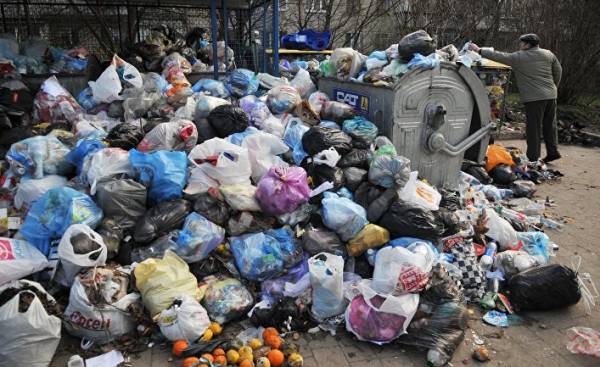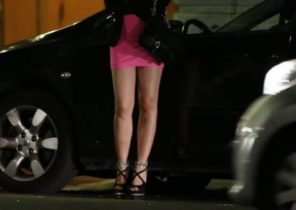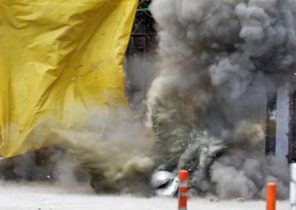
Grey glacier debris on the field in front of the house Natalia Crystalux is a growing obstacle to development in Ukraine: a country torn apart by war, drowning in its own waste.
The area near the house Natalia Krystalyn on the outskirts of Lviv is one of about 36 thousand of legal and illegal landfills whose total contents would cover the whole of the occupied Crimea and the disputed Eastern regions of Luhansk and Donetsk regions, if spread it in one layer. Like Ukraine does not have enough problems with attacks Pro-Russian rebels in the East and disillusionment of Western donors because of economic incompetence. Now the former Soviet Republic, in addition losing the fight against waste.
Authorities don’t like to raise bills for collection, and the cities slowly adapt to processing and can’t invest the billions of dollars needed for the construction of incinerators and other modern facilities. Ecological catastrophe is hardly a novelty in a country affected by the Chernobyl accident in 1986, but the risks grow with each plastic bottle that is thrown in a heap, and service providers such as Veolia Environment SA, lose potential business.
“Almost all the landfills in Ukraine are used longer an acceptable term, says Sergei Volkov, senior programme Manager for energy, environment and sustainable development the United Nations development Programme. — At any time on any of them, something can happen.”
The lack of recycling of waste
Of green two-story house Natalia Crystalus in the West of Ukraine are visible expanse of farmland, fields and small woods, which beautifully extends in the North — suddenly and abruptly cut off the 33 acres of the landfill, founded in 1960 in the Soviet Union.
“Nothing has been done, people are deceived and told that there was a restoration,” says 29-year-old pharmacist who has to carry the stroller with the sleeping 18-month-old daughter on the newly paved road along the fields.
It was assumed that the facility will be closed after a fire last year, when poisonous fumes spread even several weeks. But the inhabitants of this new district, which claimed that the landfill will soon eliminate, say, and six years later, the debris continues to accumulate.
Country located on the most fertile lands of the continent, sends 95% of solid waste in landfills. Compared to 45% in neighbouring the European Union, according to Eurostat. Only 4% of all Ukrainian waste is sorted for recycling, compared with 39% in the 28 countries members of the EU.
The risk of a crash
There is a growing risk of environmental disaster, for example, repetition of a huge fire which was not extinguished for several weeks in may 2016. Four of the rescuers died, being under 20 tons of waste.
Ukrainians pay for garbage collection, the amount corresponding to 26 to 37 cents per month, i.e., monthly bill for family of four in the apartment is less than one dollar, which is insufficient to cover operating expenses.
According to the European Bank for reconstruction and development, even given the fact that Ukrainians are among the citizens with the lowest income per capita in Europe, established by the state account for garbage collection much below the economically viable.
Illegal gathering
The government is trying to hold on to power and burdened with institutional corruption, is unable to raise taxes to the level needed to Finance infrastructure projects, to reduce the size of landfills and to introduce modern technology, says Vasily Astrov, senior economist at the Vienna Institute for international economic studies.
“The state is a fundamental problem with the taxation of individuals and business, says Astrov, because too big a share of the shadow economy and too great desire to evade taxes.”
Because the incentive payment for waste disposal are almost absent, the Western companies for the recycling of difficult to stay in Ukraine.
After two decades in Ukraine, Veolia can hardly get profit because of the mass illegal collection and disposal and lack of income.
About 80% of all waste is recycled “in the shadows” said Korolyuk, because homeless people collect garbage on the streets or landfills, and they are paid in cash while illegally operating collection companies throw waste in illegal landfills.
Fillers for jackets
Suffer and domestic companies. In a converted house on the outskirts of Lviv, where dust dozens of giant bales of crushed plastic bottles, Yuri Iskiv directs GalPET. The company buys plastic bottles and turns them into pellets for the manufacture of gaskets for jackets, plastic bottles and other products.
Two men in overalls dropping bottles for soft drinks and water in the hole and connect the hose to the ancient noisy machine that crushes, crumbles and melts them. GalPET processes up to 200 tons of plastic bottles a month, but only about one third of its capacity, because processing is not too common.
“We have a catastrophic shortage of used plastic bottles because they are not removed from the waste,” reports Iskiv.
Lviv mayor Andriy Sadovy said that this year the city hopes to begin construction of a waste recycling plant at 75 million euros from the European investment Bank. The money will also be used to clean an existing object using the “reclamation”, he said.
The project must be approved by the Ministry of regional development.
“They are not eager to help, — says the mayor of the city, so we’re looking for investors.”







